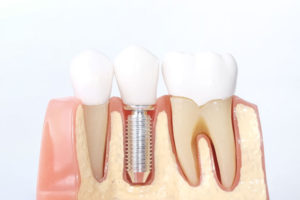Can dental Implants help tide over dental diseases?

Restorative treatment is provided by dental implants. When teeth are lost, these dental implants work as permanent replacement teeth. They provide a strong foundation for the teeth for replacement. Stability is a prime advantage in this process as they are fixed in the jaw bone with no danger of replacement teeth falling off.
Dental implants can be done for single tooth loss or multiple teeth loss. Different procedures are available that will help with this treatment. According to the need of the person these procedures are planned.
There are many advantages to dental implant treatment. Obtaining permanent replacement teeth is the main benefit. As they are permanent structures, they offer life-long support. Along with this they give a boost to appearance that is lost due to teeth loss. The speech pattern that is affected by teeth loss is restored through this procedure.
Procedure Overview
Understanding the procedure is important as this gives information on how strong and sturdy the procedure is. It offers lifelong support for dental health. This procedure is performed under anaesthesia as there need to be different procedures completed in the oral region. These implants work as the roots of the new replacement teeth. The jaw bone is cut open and a titanium metal plate is placed in the jaw bone. This will support an abutment on which replacement teeth will be placed.
Replacement teeth that are similar to natural teeth can be chosen. Temporary teeth replacement is placed sometimes by dentists and this will be later changed to permanent replacement teeth. This will be taken time as the teeth replacement are custom made. Dental implants can be placed for single teeth replacement or as a replacement for more than one tooth. They will be placed as a bridge supporting the structure and abutments placed on gaps where replacement teeth need to be placed.
Dental implants can be done for people of all ages. But in the case of children, it is postponed if the gums have not developed fully. Placing implants early will interfere with the proper development of teeth and can even stop natural teeth from erupting properly. Dentists usually suggest placing dental implants if a child is above 15-17 years of age. By this time their gum lines will be fully developed and the jaw bone will be able to support the dental implants fully.
Protecting Oral health
Gum diseases
Providing oral health is also one of the main features of this procedure. Gum diseases are common in many. The gum lining gets infected or inflamed due to bacterial infection. When an infection in the mouth is not checked and the infection spreads to the tooth and along with it the gums are also affected. The soft tissues can become reddish or become fully infected. They progress from gum inflammation to fully fledged gum disease. In this stage, the gum lining is pulled back from the teeth which create pockets in that space. This space attracts bacteria and the infection rate increases to a greater degree.
Even if there is gum disease, dental implants can be placed. Restoring the health of the gums and allowing the patient to enjoy dental replacement procedure is possible through dental implants. This is possible because this procedure helps to have the bone supported with bone grafting. Bone grafting also provides extra stability to the gum tissue. By placing the dental replacements, the oral health is enhanced. Another option possible is by treating the gum disease first and then placing dental implants. This will help the gum regain their health and they can offer proper support to the teeth replacement.
Teeth loss
Dental implants when placed, help the loss of other teeth. When teeth are replaced by other procedures such as dentures or bridges there is pressure and stress on the jaw bone and also other neighbouring teeth. When placing the teeth using these procedures, neighbouring teeth need to be ground down. This will contribute to gradual loss of the teeth.
Another teeth loss that is helped by dental implants is by helping support the jaw bone. When the teeth are lost due to tooth decay, then the infection can also spread to jaw bones.
Lack of oral hygiene will bring in plaque or tartar formation. They can be seen as deposits on the teeth. Food debris that is stuck in the teeth attracts bacterial action. The bacteria acting on the food particles release acids that will eat away the teeth. The teeth will decay with the inner pulp region being severely infected. The whole teeth then are lost. The decay can spread to other teeth and speed up the loss of teeth. Dental implants help to put stop to this issue. The replacement teeth which mimic the natural teeth fully, will help to arrest the decay and stop the decay of other teeth completely.
Dental implants help with providing replacement teeth and also support dental health by fighting against dental diseases. But it is important that proper oral hygiene is practiced. Placing dental devices for replacing teeth does not guarantee continued oral health. Proper brushing and flossing methods must be followed. Brushing after each main meal and cleaning the mouth so that food debris does not remain in the mouth is important. Keeping the teeth and tongue clean will help to protect oral health.
Going for dental consultations twice a year is important. This will give the dentist good information on the condition of the teeth and what all steps need to be taken to maintain good oral hygiene. Getting a heads up is what these consultations help with. Dentists can guide a person on to what needs to be taken care of. This can be on food intake, lifestyle, habits that need to stop as they are detrimental to oral health.
